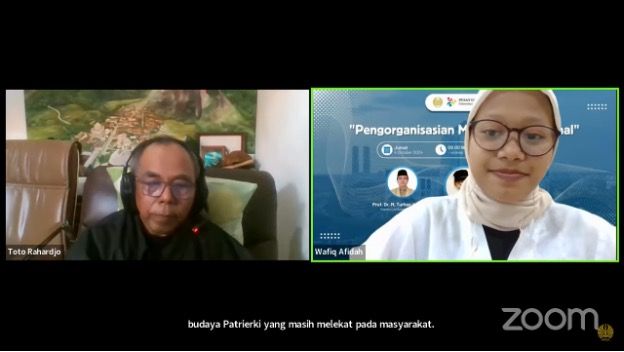The LPPM Gender Center Holds a Webinar on Organizing Marginal Communities

Unesa.ac.id, SURABAYA—The State University of Surabaya (UNESA), through the Gender Center, Institute for Research and Community Service (LPPM), held a webinar titled "Organizing Marginal Communities" on Friday, October 4, 2024.
Representing the Head of LPPM, Sjafiatul Mardliyah said that this activity focused on the issues faced by marginalized groups. It also discussed how appropriate organizing strategies can increase the active participation and well-being of marginalized groups in a sustainable manner.
"This webinar is the beginning of a longer process in ensuring that the voices and potential of marginalized communities can truly be heard and realized in concrete actions," she said.
In the material session, speaker Rofik Jalal Rosyanafi, a lecturer in Non-Formal Education at UNESA, discussed in depth the characteristics of marginalization in society. According to him, marginalized groups generally suffer discrimination and subordination, share a sense of collective identity and a common burden.
Marginalized groups also often have different physical characteristics that are not approved of by the dominant group, and various social rules limit who is considered "in" or "out" in society.
"These groups usually have low access or even no access at all to the resources they need," he explained.
He also outlined several main causes of marginalization, including the high levels of poverty and unemployment that afflict marginalized groups. In addition, negative stereotypes that are often attached to marginalized groups further exacerbate their condition, coupled with cultural factors and a policy monopoly controlled by the dominant group.
All of this will ultimately weaken the potential of human resources possessed by marginalized groups.

As a recommendation to overcome this condition, he emphasized the importance of an approach through non-formal education. He suggested skills training relevant to marginalized communities, inclusive and functional literacy programs, and efforts to increase community capacity through lifelong learning.
"Awareness raising and advocacy programs are very important so that marginalized communities can better understand their rights and be actively involved in the social development process," he concluded.
In the next session, Toto Rahardjo, Community Development Facilitator from the Indonesian Society for Social Transformation (INSIST) Yogyakarta, conveyed the importance of building relationships with the community. This is also the first step in the process of community organizing.
He emphasized that building friendships with the community is the main key to understanding their conditions and needs. The team must also be willing to learn from their lives, not come with the pretense of being a leader or elder.
"The most important thing is to believe that the community has the potential and ability to build itself," he said.
The community development process must start from what the community itself has, so that every empowerment effort can be more relevant and in accordance with local conditions. The organizing process begins with an approach, then proceeds by facilitating the process of designing strategies, mobilizing actions, and building organizational support systems.
"We need to understand the perspective used by the community in seeing problems, so that the solutions provided are truly appropriate and effective," he said.
The discussion that took place not only opened up new insights, but also motivated participants to play an active role in supporting the organization of marginalized communities through an inclusive and participatory approach.[]
***
Reporter: Mohammad Dian Purnama (FMIPA)
Editor: @zam*
Photo: UNESA PUBLIC RELATIONS Team
Share It On: